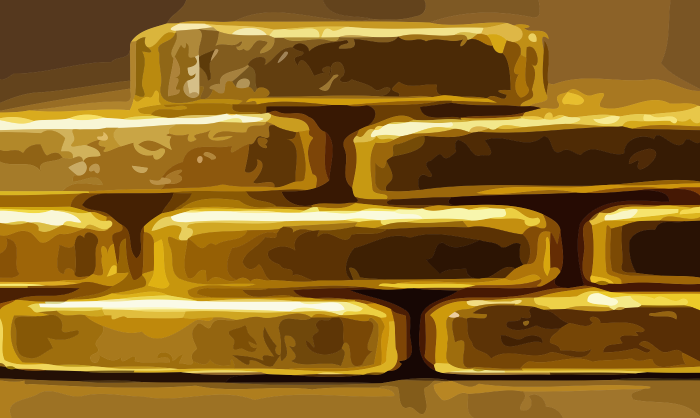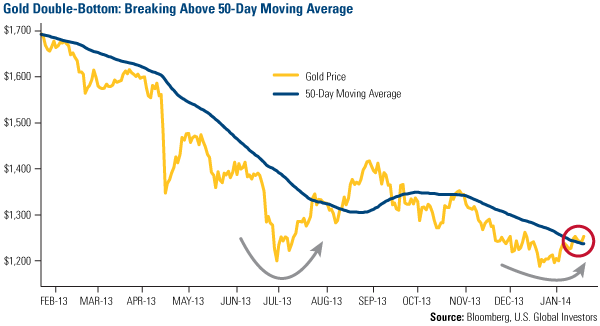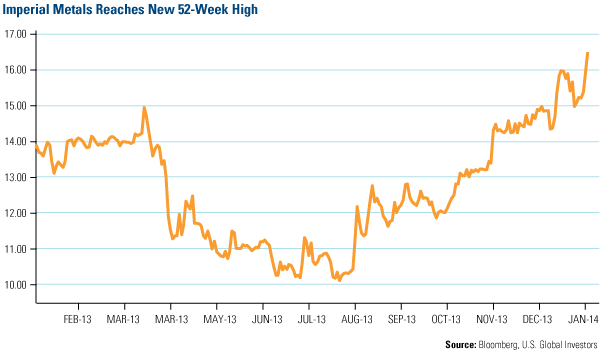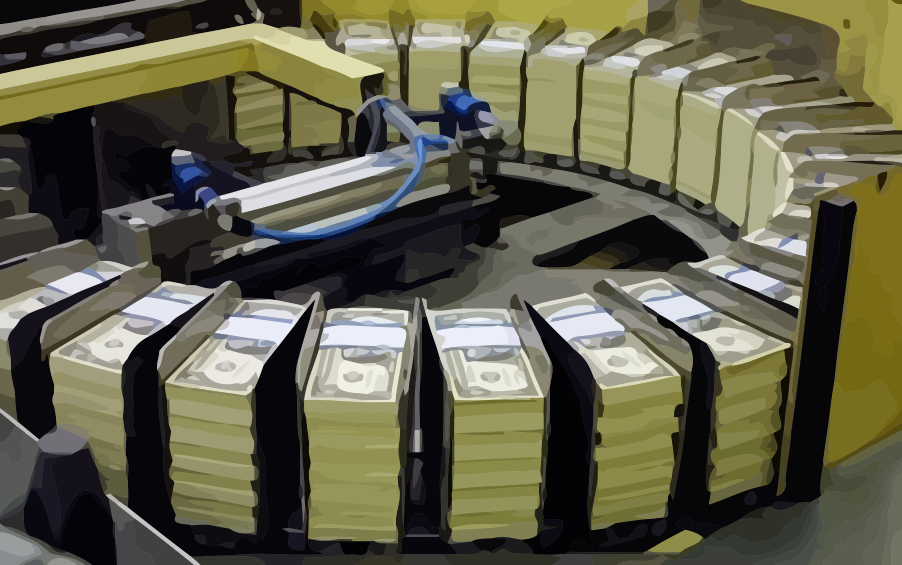Gold Market Radar (January 20, 2014)
For the week, spot gold closed at $1,254.02, up $5.57 per ounce, or 0.45 percent. Gold stocks, as measured by the NYSE Arca Gold Miners Index, rose 5.85 percent. The U.S. Trade-Weighted Dollar Index rose .67 percent for the week.
Strengths
- Gold strengthened $5.60 this week, with its price increasing $48.40 per ounce so far this year. As the chart above shows, the yellow metal continues to form its technical double bottom and is now breaking away from the 50-day moving average. Normally, as U.S. economic prospects improve, gold retreats. However, so far this year the negative correlation between the dollar and gold is at the lowest since October of last year, as purchases of bullion coins, bars and jewelry boost demand. As of the beginning of the week, the U.S. Mint sold 67,000 ounces, far more than in all of December.
- Gold received a boost this week as a government report showed the cost of living in the U.S. increased by the most in six months, boosting gold’s appeal as a hedge against inflation. The consumer price index (CPI) rose 0.3 percent in December from the previous month, putting inflation back on everyone’s radar.
- Imperial Metals rallied to a new 52-week high on positive commentary about the company’s development at its copper-gold Red Chris project in British Columbia. The stock was also a beneficiary of Goldcorp’s unsolicited bid for Osisko, which revived talks about merger and acquisition (M&A) activity increasing, especially for advanced-stage developers. In addition, the company’s high-grade copper resource at Red Chris helped the stock, as other copper names saw additional buying.
Weaknesses
- Mining companies continue to slash exploration expenditures as budgets tumble. The massive cuts in exploration seen in 2013 are being extended for a second year, setting the next leg up in gold prices as China continues its relentless pursuit of the yellow metal. Last year, exploration spending plunged by roughly $10 billion, or 30 percent, and may drop an additional 10 percent this year as major producers and junior explorers alike trim budgets, according to MinEX Consulting.
- Coeur Mining reported full-year 2013 silver production of 17 million ounces, 5 percent below the low end of the company’s guidance. CEO Mitchell Krebs said the shortfall was mostly a result of slower-than-expected leach recoveries at the company’s Rochester mine in Nevada. In addition, Coeur expects to record a $770 million non-cash impairment charge in the fourth quarter, primarily as a result from the impact of sustained lower silver and gold prices.
- Colossus Minerals, a former star of the junior mining sector, announced it will seek creditor protection after failing to make an interest payment due at the end of 2013. The fall of this name was predictable earlier last year when its dewatering process proved unsuccessful. However, Colossus continued to be a component of the GDXJ ETF up until the latest rebalancing in December. This is yet another reminder for investors of the risks posed by passive gold ETFs and their stock selection lacking fundamental analysis.
Opportunities
- The U.K. Financial Authority gold price setting investigation has claimed its first casualty as Deutsche Bank announced it will withdraw from participating in setting gold and silver benchmarks in London. The bank justified the move as a means of scaling back its commodities business. On a side note, China granted licenses to HSBC and ANZ banking group to import gold in an attempt to broaden the number of channels it uses to bring its record-setting physical gold purchases into the country.
- UBS sees platinum outperforming gold, pulled by higher economic growth in developed nations. In addition, the metal could see added upward pressure in the near term as Lonmin Plc and Impala Platinum Holdings, two of the world’s largest producers, will start to receive strike notices after a South African union called for yet another stoppage.
- Randgold Resources is a catalyst-rich company with recent underperformance, according to Barclays’ analysts. The recent de-rating is attributed to speculation around operational and political issues in the DRC, which the company expects to resolve with a site visit to its Kibali project next week. In addition, the company will report its fourth-quarter results on February 3, which has been a positive catalyst in the past.
Threats
- The Precious Metals Research team at BMO published a report that seeks to debunk some of the misconceptions about the outlook for the gold mining industry. According to the analysts, production is not likely to decline short term the way many have speculated, which will remove one of the positive supply tailwinds for gold. In addition, it asserts that companies will have a harder time cutting costs than is being assumed, and that the enforcement of the cost-cutting measures will be harder than it may appear.
- The Indian Government on Thursday announced a hike in import tariff value for gold and silver. The import tariff value of gold was hiked by 3.83 percent, and that of silver was hiked by 3.92 percent, in tandem with the precious metal prices in the international market. The move shows the Indian Government sees no urgency to remove or decrease the import burden that led to a dramatic decrease in legal gold imports to the world’s second-largest buyer of the metal.
- Goldman Sachs’ Head of Commodities Research Jeffrey Currie remains bearish on virtually all commodities, but particularly on gold, reiterating his prediction of last year that gold will fall to $1,050 per ounce by the end of this year. Speaking in London, Currie noted that not one commodity has a bullish supply story; not even gold after the recent cuts to exploration and development budgets across the industry.
















